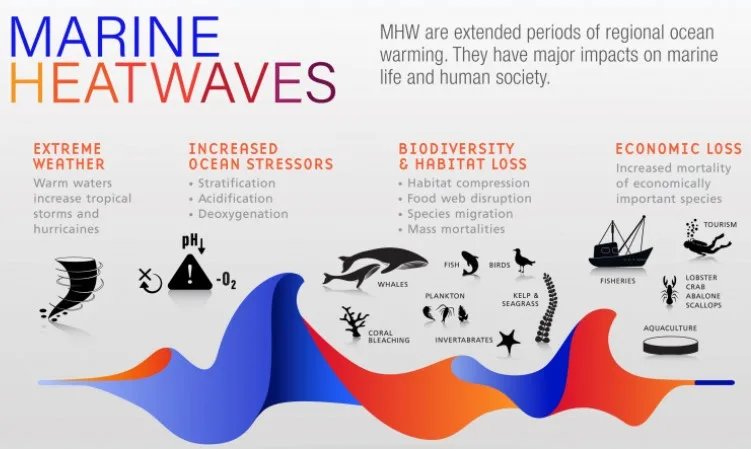Syllabus: GS3/Environment
Context
- Researchers found that Marine Heat Waves (MHWs) deep in oceans may be significantly under-reported and caused by ocean currents.
- However, they are also being impacted by global warming.
About
- In recent years, global warming has made MHWs more frequent and intense, but as per the new study this phenomenon is witnessed well beyond the surface.
- Extreme temperature changes in the temperature of the twilight zone are also a matter of concern, since many fish species and plankton reside here.
- The twilight zone of oceans is located between 200 and 1,000 metres, still has some visibility.
- Planktons form the base of the oceanic food chain and are a food source for small fish.
What are Marine Heat Waves?
- It occurs when the surface temperature of a particular region of the sea rises to 3 or 4 degree Celsius above the average temperature for at least five days. MHWs can last for weeks, months or even years.
- They can occur in summer or winter – they are defined based on differences with expected temperatures for the location and time of year.

Causes of MHWs
- Climate Change: As atmospheric temperatures rise, ocean temperatures also increase, leading to more frequent and intense heat waves.
- Ocean Currents: Changes in ocean currents influence local temperatures. For example, if warm water is transported to a specific region, it can lead to elevated sea surface temperatures.
- El Niño and La Niña Events: These climate phenomena significantly alter ocean temperatures.
- El Niño typically leads to warmer ocean conditions, which can trigger MHWs, while La Niña can have complex effects, sometimes leading to cooler temperatures in certain regions.
- Local Environmental Changes: Human activities, such as coastal development, pollution, and overfishing, alter local ecosystems and contribute to temperature increases.
Impact of Marine Heat Waves
- Deaths of Several Marine Species: MHWs along the Western Australian coast during the summer of 2010 and 2011 caused some “devastating” fish kills.
- Destruction of kelp forests: Kelps usually grow in cooler waters, providing habitat and food for many marine animals. MHWs change the ecosystem of the coast and lead to their destruction.
- Coral Bleaching: Elevated temperatures stress coral reefs, leading to bleaching and increased mortality rates.
- Species Distribution: Many marine species shift their ranges to cooler waters, affecting local ecosystems and fisheries.
- Impact on Fisheries: Altered species distributions and health affect fish populations, impacting commercial and recreational fishing.
- Economic Consequences: The fishing industry, tourism, and coastal economies suffer due to changes in fish availability and declining health of marine ecosystems.
Way Forward
- Climate Action: Reducing greenhouse gas emissions is crucial.
- Transitioning to renewable energy sources and improving energy efficiency, can help mitigate climate change and its impacts on marine ecosystems.
- Enhanced Monitoring: Investing in ocean monitoring systems can improve our understanding of MHWs.
- Research and Modeling: Supporting research on the causes and consequences of MHWs is vital.
- Community Engagement: Involving local communities in conservation and management efforts can foster stewardship of marine resources.
- Support for Vulnerable Communities: Providing assistance to communities that rely on marine resources for their livelihoods can help them adapt to changing conditions.
- Innovative Solutions: Exploring new technologies and methods, such as aquaculture and seaweed farming, can help mitigate the impacts of MHWs while providing sustainable food sources.
Source: IE
Previous article
News In Short 18-10-2024
Next article
On the Exception to Marital Rape